If we want to reach global warming targets we have to change how we eat, a new study has found.
The Paris Agreement’s global warming targets are being put at risk by global emissions from food production, according to research.
In order to meet the targets, which are central to the Paris Accord, scientists say we must make “major changes” to how our food is produced. A new study has found that even if we cut emissions from all other sources by 2050, greenhouse gases from our food system would be enough to push the planet beyond the internationally agreed target of 1.5 degrees celsius within 20 years.
“Discussions on mitigating climate change typically focus on reducing greenhouse gas emissions from burning fossil fuels, for instance, from transportation or energy production,” says Dr Michael Clark, a researcher at the University of Oxford and lead author of the paper.
“However, our research emphasises the importance of reducing emissions from the global food system.”
Despite emissions from energy falling due to the growing use of clean technology, farming and food production have received less attention when it comes to carbon-cutting policies.
If emissions from food production continue to grow at the current rate, they would reach 1,356 gigatons by the end of the century, according to the study, which was published in the journal Science.
The food system currently makes up around 30 per cent of global greenhouse gas emissions. Deforestation, natural habitats being turned into farmland, the use of artificial fertilisers and methane from livestock are all major factors in agriculture’s contribution to the climate crisis.
How can we cut carbon emissions from food?
“The good news is that there are many achievable ways to rapidly reduce food emissions if they are acted on quickly,” says Clark.
He told the Guardian that the study clearly shows that the world’s growing population could all be fed a healthy diet and Paris goals could be met if major changes are made to food production. Cutting food waste in half, for example, would bring carbon emissions within targets for the 2 degree celsius warming limit.
Clark added that these solutions “include both raising crop yields and reducing food loss and waste, but the most important is for individuals to shift towards predominantly plant-based diets.”
To cut emissions, research has consistently found that our diets need to change. If people in rich countries, such as the US and those in Europe, reduce the amount of meat, dairy and eggs they ate then the chances of reaching the Paris Agreement targets would significantly increase.
The study makes no recommendations for the policies countries need to adopt to make this happen but other experts have some ideas. Earlier this week, an alliance of health professionals in the UK called for the introduction of a tax on foods that have a heavy environmental impact like meat.
“I am the first to admit that I enjoy a steak every now and then, but it’s clear that if we are to avoid dangerous levels of global warming we must start to reconsider our attitudes to food,” says Professor Andrew Goddard, president of the Royal College of Physicians.












